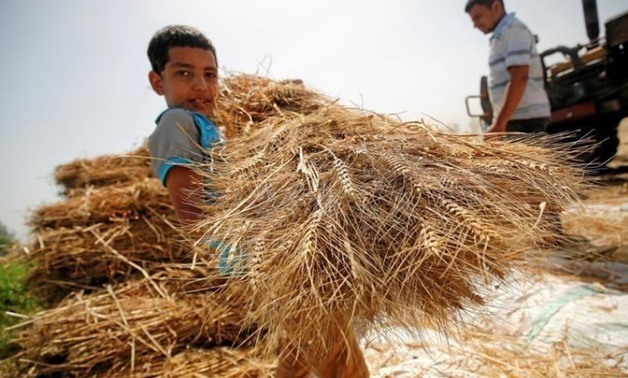
A son of farmer carries freshly harvested wheat in a field in Qaha, El-Kalubia governorate, northeast of Cairo, Egypt May 5, 2016. REUTERS/Amr Abdallah
CAIRO – 28 February 2018: The government is preparing a unified plan to use the field irrigation system for watering an area of 5 million feddans (1 feddan = about 1.038 acres) to meet the increasing demand for water.
The government is planning a radical conversion from the usage of traditional irrigation systems to modern ones like a field irrigation system and center pivot irrigation, aiming to bring down the costs of agricultural production and to promote the cultivation of crops that can be grown with much less water.
Minister of Agriculture Abdel Moniem Al-Banna added that the new plan is aimed at involving the agricultural cooperative organization and farmers in paying the installments of the costs of the new irrigation scheme to ensure the sustainability of the project.
The ambitious vision also includes having a complete maintenance team to be available, and it will be formed in cooperation with the water users and beneficiaries in each governorate.
The ministry’s plan will expectedly help counter the mounting production costs and will consequently address the food shortage, depending on the horizontal and vertical diversification in agriculture.
During the “Egypt Can…With the Sons of the Nile” conference held on Sunday in Luxor and attended by 23 Egyptian international scientists, Minister of Water Resources and Irrigation Mohamed Abdel-Ati remarked that the country allocates LE 70 billion ($4 billion) out of LE 900 billion in investments for the crisis of water shortage.
Egypt suffers from a water deficit of 30 billion cubic meters. It annually needs at least 90 billion cubic meters of water to cover 90 million citizens’ needs. However, it currently has only 60 billion cubic meters, of which 55.5 billion cubic meters come from the Nile and half a billion cubic meters come from non-renewable subterranean water in the deserts.
Egyptian population growth is projected to increase by 2050 to 65-75 percent, causing a challenge. Hence, Abdel-Ati added that the Ministry of Irrigation is adopting a water security strategy by desalinating water, managing waste water and rationalizing water usage.

Comments
Leave a Comment